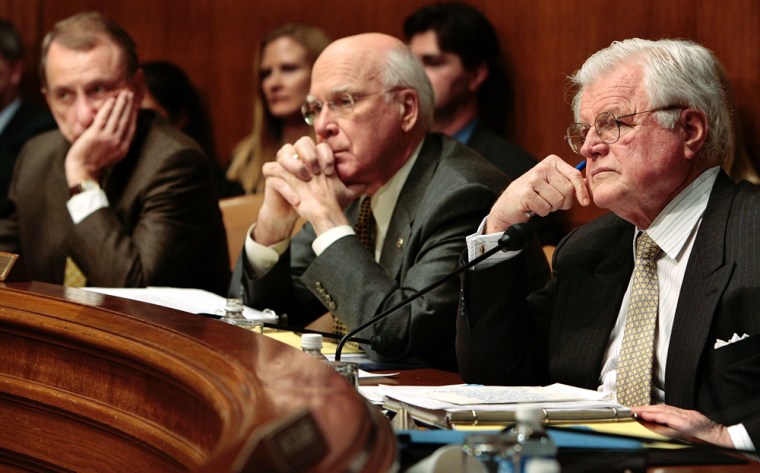When the New York Times revealed late last year that the Bush administration was conducting a surveillance program to listen in on American citizens’ conversations with suspected al Qaida operatives, it sparked a furor.
Some Democrats said President Bush had willfully broken the 1978 law banning warrantless domestic surveillance by ordering eavesdropping on U.S. citizens.
The American Civil Liberties Union and Moveon.org, the grass-roots Democratic advocacy group, demanded the appointment of special prosecutor to go after the alleged lawbreakers in the Bush administration.
But now, two months later, another furor — over a Dubai-based firm’s acquiring of leases on terminal facilities at several U.S. ports — has blown the NSA story right off the front pages.
Spying apparently continues
Yet the NSA apparently continues to eavesdrop on Americans, and Congress seems increasingly likely to open the way to after-the-fact approval of the surveillance in legislation that may reach the Senate floor in the next several weeks.
Senate Majority Leader Bill Frist, R-Tenn., said Specter and other senators would confer in his office late Tuesday to decide on how to move ahead with an NSA spying bill.
On Tuesday, Judiciary Committee chairman Sen. Arlen Specter, R-Pa., gathered a group of legal scholars and former government officials, including James Woolsey, who headed the Central Intelligence Agency under President Clinton, to get their views on legislation he’s proposing that would require a special federal court, the Foreign Intelligence Surveillance Court, to give its OK to the NSA surveillance.
Former Reagan administration Justice Department official Bruce Fein, an outspoken foe of the surveillance, told the committee that Congress ought to use its power to cut off the NSA program’s funding.
“The power of the purse is perhaps the greatest power the Founding Fathers entrusted to the legislative branch” and it “should be used now” to end the program, Fein said, unless Bush explains why he could not stay within the confines of the 1978 Foreign Intelligence Surveillance Act, which bans warrantless eavesdropping in the United States.
But only one of the Judiciary Committee’s Democratic critics of the Bush administration, Sen. Russ Feingold, D-Wisc., seemed inclined Tuesday to take up Fein’s proposal.
Indeed Judiciary Committee member Sen. Charles Schumer, D-N.Y., while critical of the administration for not revealing more about the NSA program, was specific after the hearing in saying, “I do not want to have it ended; I’ve never wanted to have it ended, I just want to make sure that somebody is overseeing it.”
Program is 'blatantly illegal'
Former Clinton administration State Department official Harold Hongju Koh, who is now Dean of Yale Law School, told Specter’s committee that the NSA spying was “as blatantly illegal a program as I’ve seen.”
If Congress went along with Bush’s rationale for the NSA spying, it “would turn this body into a pointless rubber stamp whose limited role in the war on terror would be enacting laws the president could ignore at will.”
And Koh told Specter his bill wouldn’t remedy the problem. One reason: Specter’s bill would allow the FISA court to authorize the entire NSA spying program, not particular searches of particular people. Therefore it would allow a general warrant, which is what the Framers of the Constitution tried to ban by writing the Fourth Amendment, Koh said.
But Woolsey gave his strong endorsement to the NSA spying.
“We live on the battlefield,” he said. “The inherent authority of the president under Article 2 (of the Constitution) under these circumstance permits the types of intercepts that are being undertaken.”
The United States has been invaded, he said, “and defending against invasion is at the heart of the president’s article 2 authority.”
Connecting ports to NSA spying
Sen. Patrick Leahy, D- Vt., did connect the hot issue of the Dubai Ports World acquisition of leases to operate terminal facilities with the now lukewarm or cold issue of NSA spying. In both cases, Leahy said, “this obsessively secretive administration proceeded with actions it must have known would face strong bipartisan opposition.”
He assailed the NSA program as “secret wiretapping of ordinary Americans” and accused the Bush administration of “running roughshod over the Constitution.”
He raised the question of whether Bush could grant immunity from prosecution to administration officials who conducted the surveillance.
Another Democrat on the committee, Sen. Edward Kennedy, D-Mass., said that administration officials, as well as telecommunications companies, might face lawsuits for what they have done under the NSA program.
The Democrats’ reference to criminal prosecution or civil lawsuits echoed what ACLU official Caroline Frederickson said three weeks ago: one deterrent to Bush administration officials carrying out NSA surveillance is their prosecution.
A future administration, perhaps a Democratic one elected in November 2008, might do the prosecuting.
Asked where the NSA controversy was headed, Feingold said, “It’s up to Congress, whether Congress has the courage to stand up to an extreme assertion of executive power.”
Feingold said cutting off funding is one option that he is looking at. “There’s a time and a place to do that which is coming up soon,” he said.
He added, “We have to address the fact that the president has broken the law.”
Feingold also said he opposed Specter’s proposed bill because “it hands over congressional power to the executive a way that I think is very disturbing in terms of the protections in the Bill of Rights.”
